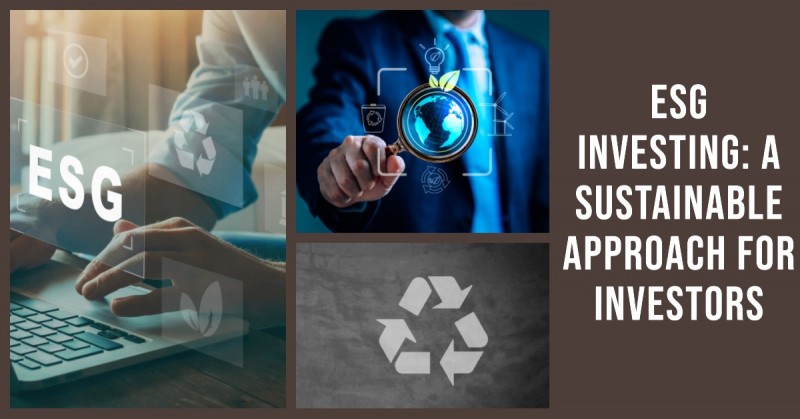
In recent years, a significant shift has taken place in the investment landscape. Investors are now not only concerned about financial returns but also the impact of their investments on the world. This has given rise to a new approach known as ESG (Environmental, Social, and Governance) investing. ESG factors are increasingly being considered by investors, focusing on the sustainability and societal impact of companies. The integration of environmental, social, and governance criteria in investment decision-making is a key trend in the share market.
Introduction: Understanding ESG Investing
ESG investing is an approach that takes into account environmental, social, and governance factors alongside financial considerations when making investment decisions. It recognizes that companies with strong sustainability practices and positive societal impact are likely to perform well in the long run.
Environmental Factors
In ESG investing, environmental factors focus on a company's impact on the natural environment. This includes assessing a company's carbon emissions, water usage, waste management practices, and renewable energy initiatives. Investors look for companies that are committed to reducing their environmental footprint and mitigating climate change risks.
Social Factors
Social factors encompass a company's impact on society, including its relationships with employees, customers, suppliers, and local communities. Investors evaluate aspects such as labor practices, diversity and inclusion, human rights, product safety, and community engagement. Companies that prioritize social responsibility and ethical practices are more likely to attract ESG-conscious investors.
Governance Factors
Governance factors pertain to a company's leadership, board structure, and policies that guide decision-making. Investors assess transparency, accountability, and the alignment of executive compensation with performance. Companies with strong governance frameworks and effective risk management practices are deemed more trustworthy and are favored by ESG investors.
The Benefits of ESG Investing
ESG investing offers several benefits for both investors and society as a whole. By integrating ESG factors into investment decisions, investors can align their portfolios with their values, contributing to positive change. Additionally, companies that prioritize ESG practices tend to be better equipped to manage risks, enhance their reputation, attract top talent, and foster long-term shareholder value.
ESG Investing Strategies
There are different approaches to ESG investing, including screening, integration, and impact investing. Screening involves excluding companies involved in controversial activities, such as tobacco or weapons. Integration incorporates ESG factors into traditional financial analysis to identify companies with superior ESG performance. Impact investing focuses on investing in companies or projects with the explicit goal of generating positive social or environmental outcomes.
ESG Metrics and Ratings
To evaluate a company's ESG performance, various metrics and ratings systems are available. These assessments provide investors with standardized information to compare companies based on their ESG practices. Examples include the Dow Jones Sustainability Index, MSCI ESG Ratings, and the Carbon Disclosure Project.
ESG Integration in Portfolio Construction
ESG integration involves incorporating ESG factors into the construction and management of investment portfolios. It requires thorough analysis and engagement with companies to understand their ESG risks and opportunities. By integrating ESG considerations, investors can potentially enhance risk-adjusted returns and contribute to a more sustainable economy.
The Role of Investors in Driving Change
ESG investing has the potential to drive positive change by incentivizing companies to adopt sustainable practices. Through engagement and active ownership, investors can influence companies to improve their ESG performance and transparency. Shareholder activism and proxy voting are some of the tools investors can use to advocate for positive change.
Overcoming Challenges in ESG Investing
While ESG investing has gained momentum, it also faces certain challenges. Lack of standardized ESG data, greenwashing, and the subjective nature of ESG assessments can make it difficult for investors to navigate the ESG landscape. However, efforts are being made to address these challenges and enhance the credibility of ESG investing.
Case Studies: Successful ESG Investments
Several case studies demonstrate the potential of ESG investing. Companies that have embraced sustainability practices and strong governance have seen improved financial performance and investor confidence. Examples include renewable energy companies, socially responsible consumer brands, and companies that prioritize employee well-being.
Future Trends in ESG Investing
ESG investing is expected to continue growing in prominence as investors increasingly recognize its importance. The integration of artificial intelligence and big data analytics in ESG assessments, increased regulatory focus on ESG disclosures, and the emergence of green bonds are some of the trends shaping the future of ESG investing.
Conclusion
ESG investing represents a paradigm shift in the investment landscape. Investors are now placing greater emphasis on the sustainability and societal impact of companies. By considering ESG factors alongside financial metrics, investors can align their portfolios with their values and contribute to a more sustainable and equitable future.
Microsoft's market cap reaches a record $2.6 trillion thanks to an AI push
Kapil Sharma or Rupali Ganguly? Know who is the richest star of TV
Optimizing Your Investment Strategy for Wipro Shares' Ex-Buyback Record Date